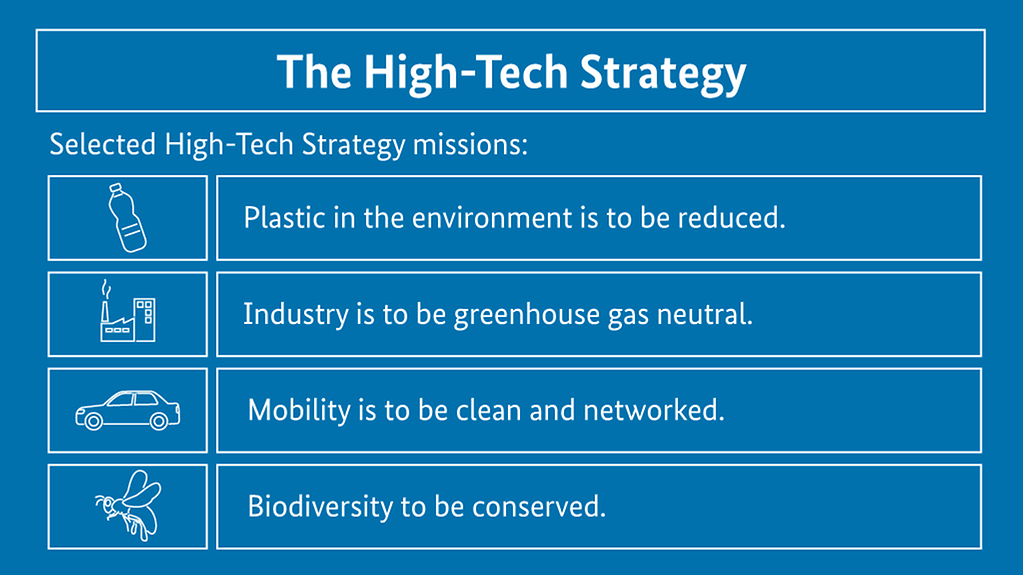High-Tech Strategy 2025
Species diversity, climate action and environmental protection, resource efficiency and renewable energy are crucial factors if we aim to move forward into a sustainable future. The Federal Ministry of Education and Research is focussing its activities in these areas under the umbrella of the High-Tech Strategy 2025.
3 min reading time

The High-Tech Strategy illustrates the prospects of a successful future for German research and innovation.
Photo: Bundesregierung
The German government is aiming to respond to the needs of both today’s generation and the generations to come. One way of doing this is to promote research into sustainability. Under the High-Tech Strategy 2025, the government has identified four research priorities for sustainability. One is sustainable circular economic activity.
Circular resource management
To achieve this, the private sector will also have to undergo a radical transformation, towards a resource-efficient circular economy, resulting in sustainable, bio-based economic activity. Currently, the global economy is 91 per cent linear, i.e. goods are produced, used and then disposed of. Only 9 per cent of resources used in the economy are recycled and reused.
The High-Tech Strategy is particularly important for the research and innovation promotion efforts of the German government. It is laid down at the start of every legislative period; in September 2018 the High-Tech Strategy 2025 was drawn up.
Renouncing the use of fossil fuels
To facilitate recycling and a circular economy, fossil fuels are to be replaced by renewable, sustainable sources of energy wherever possible. To achieve this goal, evidence-based and application-relevant research is to play a more prominent role. As soon as it is possible to decouple economic growth from the consumption of resources, it will be possible not only to cut greenhouse gas emissions but also to reduce the waste generated. Environmental pollution and dependence on imported raw materials will also decline.

The High-Tech Strategy 2025 focuses the research and innovation policy of the German government.
Photo: mauritius images / Westend61 / Florian Küttler
A resource-efficient circular economy is already mainstreamed at political level in the German Resource Efficiency Programme (ProgRess). Various ministries are involved in implementing measures to achieve this objective: the Federal Ministry of Education and Research, the Federal Environment Ministry and the Federal Ministry of Food and Agriculture.
The National Research Strategy BioEconomy 2030 and the Research for Sustainable Development (FONA) Framework Programme are examples of the government’s research activity in this field. Additionally, between 2018 and 2023, up to 150 million euros is to be invested in the Resource-efficient Circular Economy concept published in 2018. Another focus of research within the scope of the High-Tech Strategy 2025 is the Research Initiative for the Conservation of Biodiversity. By 2025 a total of 200 million euros is to be invested in preserving species diversity.
For climate and the environment
The High-Tech Strategy 2025 aims to minimise the volume of plastic that finds its way into the natural environment. With the help of the Osaka Blue Ocean Vision, adopted at the 2019 G20 summit in Japan, additional plastic waste entering the oceans is to be reduced to zero by 2050. To this end, the German government has set the research priority Plastics in the Environment – Sources – Sinks - Solutions to run until 2021, and made the promotion and development of bio-based plastics a goal.
Alongside sustainable economic activity with recycling, another important aspect of research into sustainability within the scope of the High-Tech Strategy 2025 is achieving greenhouse gas neutrality in industry. By 2050 Germany, and the entire European Union, is to achieve greenhouse gas neutrality.
The energy shift, putting Germany’s energy mix on a more sustainable footing, continues to be a key thrust, especially the energy policy triangle, that is designed to ensure secure, affordable, environmentally sound energy supplies. Meanwhile digitalisation is to be harnessed to a greater extent in the interests of sustainability.
The High-Tech Strategy 2025 is an invitation to cooperate and can thus also serve as guidelines for cooperation among innovative forces throughout Europe. It illustrates the prospects of a successful future for German research and innovation.